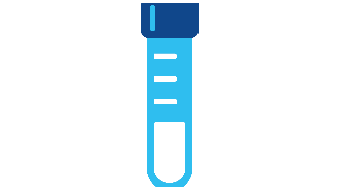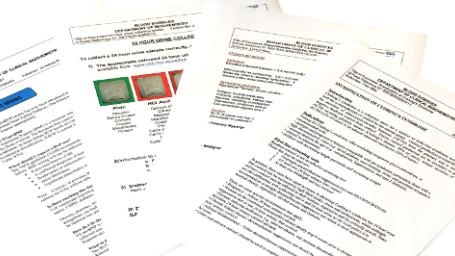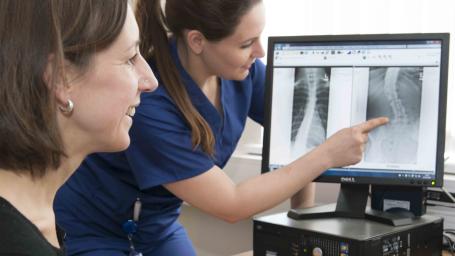Whole Genome Sequencing Testing For Rare Disease
Is my patient eligible?
To review patient eligibility please Check the National Genomic Test Directory
All current versions of the resources associated with the request process are curated on NHS England Genomic website under the Genomics Resources tab
For ease of navigation direct links are in blocks on below.
One page pathway guide for Rare Disease
R15 Primary Immunodeficiency Pre-Test Proforma
You can access the R15 Primary Immunodeficiency Pre-Test Proforma below:
Requesting reanalysis of existing data
For patients who have already had a WGS test under the National Genomic Test Directory (NGTD), reanalysis of a new gene panel or applying the latest version of the previous panel is only available where there is a change in clinical circumstances to justify the test. This would include a significant change in the patient’s disorder, potential new treatment or clinical management applicable or a new pregnancy which might be impacted by testing. There also needs to be a significant expectation that the re-analysis will provide a diagnosis which was not made by the original test.
For cases that satisfy those requirements, please complete the form below:
and send to: SWGLHexports@nbt.nhs.uk
Requesting a WGS test for Rare Disease

NHS WGS test order form for rare disease:-
https://www.england.nhs.uk/publication/nhs-genomic-medicine-service-test-order-forms/
For sample information and transport options please see: Sample Requirements and Transport
Complete the two forms below and send to mailto: SWGLHexports@nbt.nhs.uk
NHS Genomic Medicine Service record of discussion form
Additional Forms

All published forms can be found directly on the NHS Genomic Medicine Service Resources website.
For expediency we have directly linked to additional forms that may be required for specific circumstances in the conversation process:
NHS Genomic Medicine Service young persons' assent form
NHS Genomic Medicine Service genomic consultee declaration (adult requests only)
Below is the form for opt in and out to the National Genomic Research Library as part of the conversation process:
NHS Genomic Medicine Service participation in research form
Patient Leaflets
All patient information leaflets can be found on NHS England National Genomic Services Resource pages and Genomics England Patients and Participants website pages
Direct links here:
Whole genome sequencing for a rare disease:Information for patients and family members
Whole genome sequencing for a rare disorder - easy read version
Genomics England Genomics Research and why it's important
Clinical Guides for Rare Disease

One page pathway guide for the request process for Whole Genome Sequencing in Rare Disease can be accessed in the drop down at the top of this page.
The HEE resource for guidance on elements of the consent conversation can be found here:
HEE GEP Guide to requesting WGS test - RD
Genomics Education Programme Resources

There are many excellent education packages to support your genomic learning journey at Genomics Educational Resources
For more targeted Genomics Education resources to support Whole Genome Sequencing test pathway
Whole Genome Sequence request need advice?

If you require further information regarding genomic testing please contact the laboratory
Tel:0117 4146168 or SWGLHexports@nbt.nhs.uk
If you require support for navigating the pathway including completion of paperwork please contact the Genomic Healthcare Practitioners
email rduh.swgenomicpractitioner@nhs.net
Intensive Care Public Involvement Group
We're seeking fresh perspectives for our Head Injuries Public Involvement Group within the Intensive Care Unit.
We want to hear from people who have had a head injury in the past, and their families or carers to be part of an ongoing Patient Involvement Group, discussing aspects of upcoming clinical research studies in Intensive Care. The studies will look at possible new treatments for patients with head injuries in Intensive Care.
How you can help
- Assist us in how best to communicate our studies to the families of the patients involved
- Give feedback on patient study information that will be provided to a patient’s family about taking part in a research study
- Join in on Public Involvement Group meetings on an ad hoc basis. At present these are being held virtually.
To ensure that you are not out-of-pocket, we will provide a £25 Love2Shop voucher for each meeting, helping to cover your out of pocket expenses such as parking costs.
Getting Involved
If you would like to participate in this Patient Involvement Group, please contact:
Kati Hayes: kati.hayes@nbt.nhs.uk | 0117 41 49330
Research Nurse (Working Hours: Mon – Fri, 8:30am – 16:30pm)
or
Dr Matt Thomas: matt.thomas@nbt.nhs.uk
ICU Clinical Research Lead
or
Sharon Nolan: sharon.nolan@nbt.nhs.uk
Research Communications and Patient & Public Involvement Manager
Take Part in Research

Become one of the thousands of people taking part in research every day within the NHS.
About Research & Development

Find out more about our research and how we're working to improve patient care.
Contact Research
Research & Development
North Bristol NHS Trust
Level 3, Learning & Research building
Southmead Hospital
Westbury-on-Trym
Bristol, BS10 5NB
Telephone: 0117 4149330
Email: research@nbt.nhs.uk
